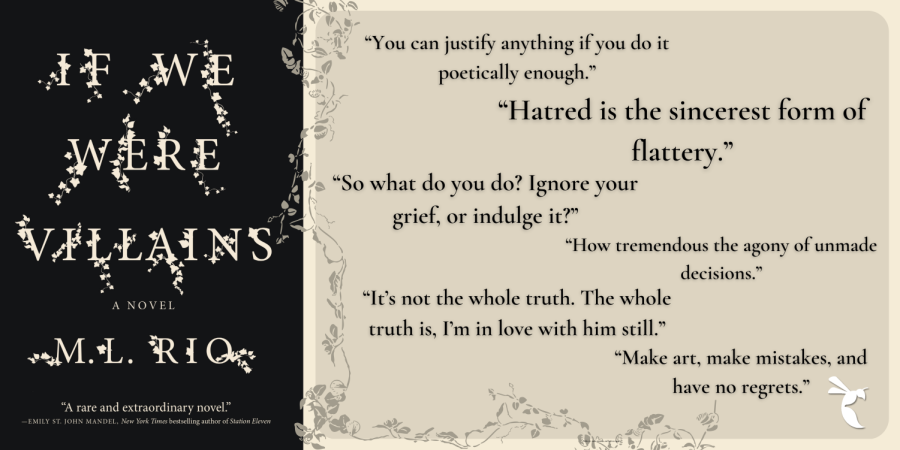Diary of a Bookworm: 'If We Were Villains;' a tragedy you'll never forget - StateHornet.com
M. L. Rio's novel is a modern-day masterpiece
Disclaimer: Major spoilers for the book are included in this review.
Dear diary, does life imitate art or does art imitate life?
M. L. Rio asks something similar in the Q & A section of her novel "If We Were Villains." But after reading the book, I came to the conclusion that life imitates art. This may not be true for everything, but it's true for the characters in this novel.
In "If We Were Villains," seven fourth-year theater students attend the prestigious Dellecher Classical Conservatory where they've been playing the same roles since they started:
- James Farrow plays the hero.
- Alexander Vass plays the villain.
- Richard Stirling plays the tyrant.
- Meredith Dardenne plays the temptress.
- Wren Stirling plays the ingénue.
- Oliver Marks plays the hero's companion.
- Filippa Kosta plays the extra.
Each year on Halloween, the theater students of Dellecher put on a traditional performance of Macbeth. But when the seven fourth-years get different roles in the play, everything begins to change.
10 years later, Oliver is released from prison after being arrested for the murder of Richard Stirling, one of his beloved classmates, and he's ready, to tell the truth of the most tragic and chilling year of his life.
From writing style to character development and plot line, Rio kept me on the edge of my seat the entire read. "If We Were Villains" is now in my top-five favorite novels.
I rarely find novels that I completely fall in love with, but I know I've fallen in love with a book when I feel the pain and emotion the characters are feeling — in this case, I wept.
One of the main aspects of the novel that I was hooked on immediately was the imagery of life imitating art.
Oliver Marks plays the role of the hero's sidekick or close confidant both on and off stage.
"I seemed doomed to always play supporting roles in someone else's story," Oliver said. "Far too many times, I had asked myself whether art was imitating life or if it was the other way around."
James relied on Oliver as a close companion and close confidant, much like the role of a hero and his sidekick. Meredith relied on Oliver to comfort her after a significant loss in her life. Alexander relied on Oliver to keep his secrets.
Story continues below graphic.

Throughout the book, the characters perform several Shakespeare tragedies and plays that happened to reflect their own actions and life stories. This connection between the performances and the lives of the performers thrilled me.
Defined by Owlcation.com, there are nine elements to a Shakspeare play that make it a tragedy: a tragic hero, a struggle between good and evil, hamartia, tragic waste, external and internal conflict, catharsis, supernatural elements, lack of poetic justice and comic relief.
All of these aspects are seen in the characters' stories, but a few of them stood out to me the most.
First, internal and external conflict.
On opening night of Cesar, months after their Macbeth performance, a physical altercation breaks out between some of the fourth-years and Richard is found dead the next morning.
After the group finds their friend dead in a lake, they immediately plan to stick to the same story: telling the police it was an accident. For five of the six living colleagues, that is true, which signifies an external conflict.
Oliver knows that the other death was homicide, but was too afraid to dig deeper to find out who of his closest friends had committed such an unthinkable crime, causing him to fight with his internal morals, sometimes even thinking he committed the crime unknowingly. This is an internal conflict.
Second, a lack of poetic justice.
According to owlcation.com, a lack of poetic justice is when "things end poorly for everyone, including the 'good guys.'" Without spoiling the ending of the book too much, each character experiences a poor ending one way or another.
Lastly, a tragic hero.
A tragic hero is the protagonist of the story who, after many errors in judgment, eventually accepts his downfall, ending in a tragedy.
Although the novel is told from the point of view of Oliver, who mainly plays the hero's companion, we know from the beginning that he is the one who was arrested for Richard's murder, signaling the "tragic hero" archetype in the reader's eyes.
All of these aspects are alluding to the imagery of life imitating art.
"
"We're only ever playing fifty percent of a character. The rest is us, and we're afraid to show people who we really are. We're afraid of looking foolish if we reveal the full force of our emotions." "
— M.L. Rio, If We Were Villains
I could write about "If We Were Villains" and every single detail I noticed about it, but it would go on forever.
Rio writes mesmerizingly, keeping every reader hooked in from the beginning. Not only is the writing style beautiful, but the details in the novel connect somehow.
"If We Were Villains" is a great read for advanced book lovers looking for a dip into dark academia and eloquent writing styles.
Rated nine and a half out of 10.
Sincerely, a bookworm.



Comments
Post a Comment